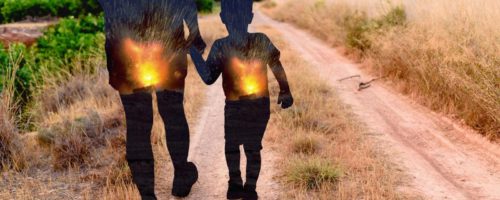Can the legacy of trauma be passed down the generations?
Share
Explore Our Galleries
Breaking News!
Today's news and culture by Black and other reporters in the Black and mainstream media.
Ways to Support ABHM?
Our children and grandchildren are shaped by the genes they inherit from us, but new research is revealing that experiences of hardship or violence can leave their mark too.
By Martha Henriques, BBC.com

Epigenetics is thought to be the link between nature and nurture, where a person’s experiences alters how their DNA is read by their cells (Credit: Alamy/Getty Images/BBC)
In 1864, nearing the end of the US Civil War, conditions in the Confederate prisoner of war camps were at their worst. There was such overcrowding in some camps that the prisoners, Union Army soldiers from the north, each had the square footage of a grave. Prisoner death rates soared.
For those who survived, the harrowing experiences marked many of them for life. They returned to society with impaired health, worse job prospects and shorter life expectancy. But the impact of these hardships did not stop with those who experienced it. It also had an effect on the prisoners’ children and grandchildren, which appeared to be passed down the male line of families.
While their sons and grandsons had not suffered the hardships of the PoW camps – and if anything were well provided for through their childhoods – they suffered higher rates of mortality than the wider population. It appeared the PoWs had passed on some element of their trauma to their offspring.
But unlike most inherited conditions, this was not caused by mutations to the genetic code itself. Instead, the researchers were investigating a much more obscure type of inheritance: how events in someone’s lifetime can change the way their DNA is expressed, and how that change can be passed on to the next generation.
This is the process of epigenetics, where the readability, or expression, of genes is modified without changing the DNA code itself. Tiny chemical tags are added to or removed from our DNA in response to changes in the environment in which we are living. These tags turn genes on or off, offering a way of adapting to changing conditions without inflicting a more permanent shift in our genomes…
Read the full article here
More Breaking News here
View more ABHM galleries here











Comments Are Welcome
Note: We moderate submissions in order to create a space for meaningful dialogue, a space where museum visitors – adults and youth –– can exchange informed, thoughtful, and relevant comments that add value to our exhibits.
Racial slurs, personal attacks, obscenity, profanity, and SHOUTING do not meet the above standard. Such comments are posted in the exhibit Hateful Speech. Commercial promotions, impersonations, and incoherent comments likewise fail to meet our goals, so will not be posted. Submissions longer than 120 words will be shortened.
See our full Comments Policy here.